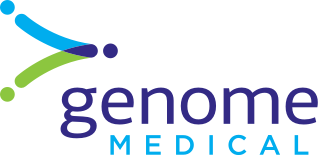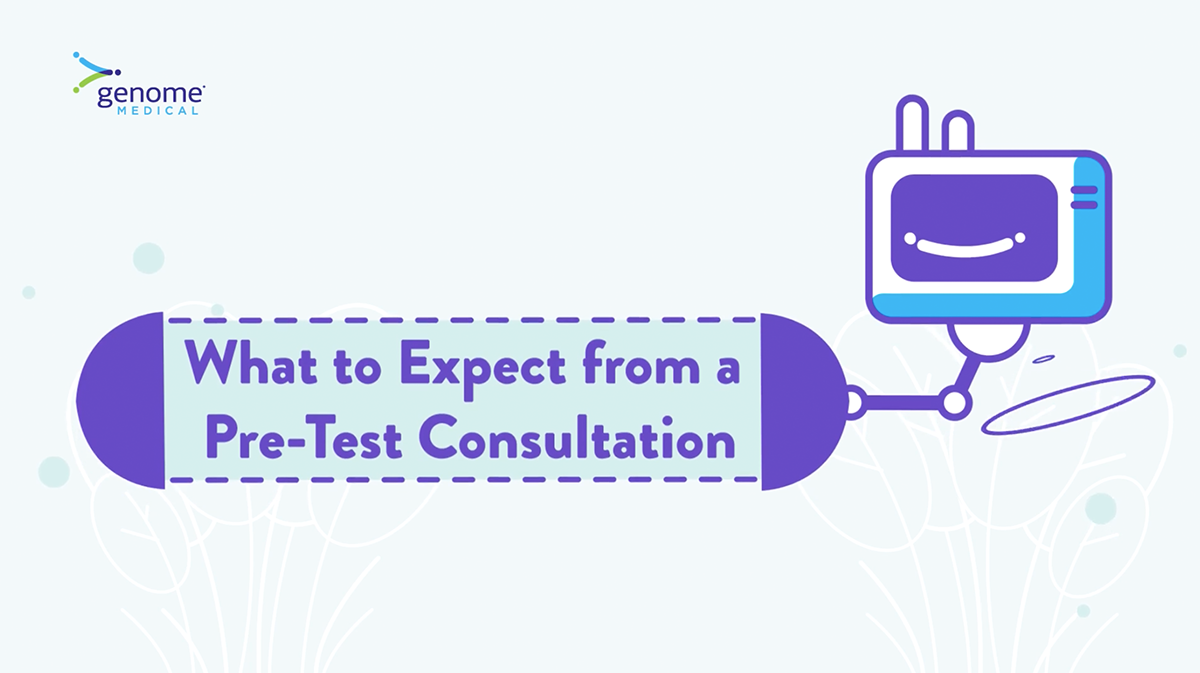The Genome Medical care team features top genetic experts and primary care MDs – all dedicated to helping accelerate the integration of genetics into everyday health care. Genome Medical experts can work with you prior to testing to identify risk of FSHD for you and your family members.
Clinically approved genetic testing for FSHD
The FSHD Society has established a genetic testing program for facioscapulohumeral muscular dystrophy (FSHD) to help patients qualify for upcoming clinical trials. Since previous clinical trials required genetic confirmation of FSHD to enroll volunteers, upcoming trials will likely also include genetic testing as an inclusion criteria. This program includes proper genetic counseling through Genome Medical’s accredited genetic counselors to fully explain the ramifications of the genetic testing and provides the necessary medical referral required for genetic testing.
Genetic testing is a separate cost from genetic counseling. Genome Medical will discuss all appropriate and available testing options and payment methods for every patient at the time of their genetic counseling appointment. The average range for the cost of genetic testing is $650-$2,000.
Clinically approved genetic testing for FSHD
The FSHD Society has established a genetic testing program for facioscapulohumeral muscular dystrophy (FSHD) to help patients qualify for upcoming clinical trials. Since previous clinical trials required genetic confirmation of FSHD to enroll volunteers, upcoming trials will likely also include genetic testing as an inclusion criteria. This program includes proper genetic counseling through Genome Medical’s accredited genetic counselors to fully explain the ramifications of the genetic testing and provides the necessary medical referral required for genetic testing.
The Genome Medical care team features top genetic experts and primary care MDs – all dedicated to helping accelerate the integration of genetics into everyday health care. Genome Medical experts can work with you prior to testing to identify risk of FSHD for you and your family members and confirm eligibility for the FSHD Society’s program.
Genetic testing is a separate cost from genetic counseling. Genome Medical will discuss all appropriate and available testing options and payment methods for every patient at the time of their genetic counseling appointment. The average range for the cost of genetic testing is $650-$2,000.
How It Works
How It Works
Why Genetic Testing?
Genetic testing can help you learn more about your disease, possible treatment options and more.
Help you make informed choices about your healthcare.
Get a diagnosis faster — determine FSHD Type 1 or 2 genes.
Learn the risk for your family members and inform your family planning.
Find resources, connect with the patient community, and find resources specific to helping you live a full life with FSHD.
Better understand your options for taking part in clinical research.
Why Genetic Testing?
Genetic testing can help you learn more about your disease, possible treatment options and more.
Help you make informed choices about your healthcare.
Get a diagnosis faster — determine FSHD Type 1 or 2 genes.
Learn the risk for your family members and inform your family planning.
Find resources, connect with the patient community, and find resources specific to helping you live a full life with FSHD.
Better understand your options for taking part in clinical research.
Frequently Asked Questions
Why did the FSHD Society establish this genetic testing program?
The FSHD Society is a research-focused patient advocacy group committed to supporting projects that will eliminate barriers to getting effective treatments to our families. The FSHD Society established this program because lack of access to genetic testing is a barrier to clinical trial recruitment and improvement in patient care.
Who is Genome Medical?
Genome Medical is the first nationwide specialty medical practice that is focused on genetics. The Genome Medical team features top genetic experts and primary care MDs—all dedicated to helping accelerate the integration of genetics into everyday health care.
What will be the cost of my genetic test?
Genetic testing is a separate cost from genetic counseling. Genome Medical will discuss all appropriate and available testing options and payment methods for every patient at the time of their genetic counseling appointment. The average range for the cost of genetic testing is $650-$2000.
What is a genetic counselor?
A genetic counselor is a genetic expert that can help you understand how genetics impacts your health, whether genetic testing is right for you and what tests might be most appropriate. A genetic counselor is specially trained to understand the complexities of genetic tests and how to interpret an individual’s unique results.
Why should I consult with one of the genetic counselors and what are their qualifications?
Genome Medical’s national network of genetic experts includes both medical geneticists and genetic counselors. Your consultation will most likely be with a genetic counselor who is a medical provider specially trained to understand the complexities of genetic tests and how to interpret your unique results. In certain cases, you may also work with a medical geneticist, a physician trained in general medicine, genetic diagnosis and the treatment of patients with genetic disorders.
Genetic counselors start by learning what important health questions you have, assessing the risk for disorders of interest, and then reviewing how genetic testing may help answer them. Their recommendations are tailored to address the issues that are most important to you. If you have questions about your results, genetic counselors are there to explain what it means and work with you to understand the best next steps and develop a care plan.
What is genetic testing?
To learn about DNA, it helps to start with our genes. We inherit our genes from our parents. Genes contain instructions for all of our traits – such as hair color, eye color, aspects of our health – many things that make us who we are. Although we can’t see them, genes are in the millions of cells throughout our bodies. Genes are found in structures called chromosomes, which are also in our cells.
Genes are made up of chemical building blocks called DNA, abbreviated as “A,” “C,” “T” and “G,” which are spelled in a very specific order to make up a gene. Since genes have instructions for our health, small changes in the way our DNA is spelled in a gene – like a typo – can impact our health. These small changes are called DNA variants.
One type of genetic testing is called DNA sequencing, which studies the DNA within our genes to look for DNA variants. Some DNA variants cause minor traits in us, like the color of our eyes. Other DNA variants can impact our health, such as DNA variants that cause us to have an increased risk for cancer.
Genetic testing looks for DNA variants to figure out a genetic cause or risk for health problems. Knowing if you or your child’s health problems have a genetic cause and the health risks can help you and your doctors better understand the prognosis, ensure the appropriate treatments are in place, and learn about family planning implications.
What are the risks of this test? How will my privacy be protected?
You should weigh the risks and the benefits before agreeing to have this test. Risks include:
- Unexpected information may be uncovered by your genomic test. We will focus on what is useful to you and provides you the best health care. However, situations such as non-paternity, adoption and unexpected risks or diagnoses could be recognized when your information is viewed along with genetic information from other family members.
- Genetic testing can have emotional effects, especially when a DNA change is found that predicts a serious disease. Genetic counselors are trained to help you understand and process those emotions and your options.
- Some people are concerned about having their genetic information revealed for others to use against them. Since this test is a clinical test, the results stored in your health record are protected by health information privacy laws, especially the Health Information Portability and Accountability Act (HIPAA).
- During the consent process, you will have the opportunity to discuss the risks of having your genetic information stored in your health record, the laws that currently prohibit genetic discrimination in certain businesses and their limitations.
How long will it take to schedule an appointment with a genetic expert?
You can schedule an appointment at your convenience, generally within 1-2 business days.
What should I expect during the pre-test consultation?
During the pre-test consultation, you’ll meet with a Genome Medical board-certified genetic counselor via video or phone to discuss your condition. The genetic counselor will answer any questions you may have, collect your personal family health history, and confirm that you qualify for no-cost, sponsored testing.
How should I prepare for the consultation?
Prior to your scheduled consultation, it would be helpful to think about the reasons for pursuing testing, and if you have any concerns regarding your family history that you were hoping to address. Please try to find out as much information as you can about your family health history before the appointment and share that information with the genetic counselor.
What should I expect during the post-test consultation?
During your post-test consultation you will meet with a Genome Medical board certified genetic counselor via video or phone. Your genetic counselor will:
- Review your genetic test results and personal and family history
- Provide a clear understanding of what your results mean for you and your family
- Develop a clinical action plan for your ongoing care that you can share with your physician
- Learn about recommended next steps
How long after I give my sample will my results be available?
In most cases, test results will be available in approximately 4-8 weeks.
How do I receive my results report?
Genome Medical will contact you via email or phone once your results are ready. At that time, we encourage you to schedule a post-test consultation to review the test results to better understand what the results mean for you and your family.
What information is included in my summary results report?
A clinical action plan is provided to you once results are complete. The plan is a written summary of the results and guidance on any actionable insights, including how you and your family’s doctor can integrate results into medical care.
What happens if results come back negative?
If results are negative, we will send you a letter, a clinical action plan, detailing your results. A follow-up consultation is available if you have questions regarding any of the test results.
What are the possible results from genetic testing?
A positive result means that a genetic change associated with the disease has been found. Depending on the gene, this result may have a small or large impact on your risk of disease. A negative result means that no genetic change associated with the disease has been found.
A negative result does not completely eliminate the chance that you have an inherited risk for a disease, it simply means that we were not able to identify a genetic risk factor based on the genes tested at this time.
A variant of uncertain significance (VUS) is a genetic change which has uncertain meaning. While some genetic variants are considered harmful, or disease-causing (also called pathogenic), other variations in genes are considered non-harmful and do not cause a genetic condition (also called benign). A VUS means that there is not enough available information regarding a particular variant to know if it is disease-causing or not. Generally, medical management and family risk assessment should not be based on a VUS test result. This type of result cannot independently confirm or provide a diagnosis. While it’s common for a variant to be considered a VUS at the time of a person’s genetic test report, it is possible that more information/evidence regarding the variant may become available over time, as more individual’s have genetic testing including the gene and potentially more research is published. Your genetic counselor can review any additional pertinent details about a VUS on your test report in relation to your medical and family history details.
How should my physician be involved?
We recommend sharing your clinical action plan with your physician so that the physician can manage any recommendations regarding the results. Your physician can also contact Genome Medical if there are any questions regarding the recommendations or results.
What are the risks of this test? How will my privacy be protected?
You should weigh the risks and the benefits before agreeing to have this test. Risks include:
- Unexpected information may be uncovered by your genomic test. We will focus on what is useful to you and provide you the best health care. However, situations such as non-paternity, adoption, and unexpected risks or diagnoses could be recognized when your information is viewed along with genetic information from other family members.
- Genetic testing can have emotional effects, especially when a DNA change is found that predicts a serious disease. Genetic counselors are trained to help you understand and process those emotions and your options.
Some people are concerned about having their genetic information revealed for others to use against them. Since this test is a clinical test, the results stored in your health record are protected by health information privacy laws, especially the Health Information Portability and Accountability Act (HIPAA).
During the consent process, you will have the opportunity to discuss the risks of having your genetic information stored in your health record, the laws that currently prohibit genetic discrimination in certain businesses and their limitations.In addition, if you give your consent, Genome Medical will forward your contact information (not your test results) to the FSHD Society as a newly diagnosed patient. The FSHD Society can then provide you with more accurate information about resources available to you and your family.
Should I receive a positive diagnosis of FSHD, where can I go for help and support?
The FSHD Society is the largest network of patients, families, clinicians, researchers and friends – all advocating for FSH Muscular Dystrophy. We work to connect patients, family, and loved ones to others who understand firsthand what you’re going through. Whether you are looking for information, resources, or just a shoulder to lean on, the FSHD Society gives you the support you need to keep hope within reach.
There is great power in community. When we come together, each bringing our own unique strengths and skills, we inspire each other to go farther and reach higher than we can when we go it alone. Come join the world’s largest network of patients, families, clinicians, researchers, and friends advocating for Facioscapulohumeral Muscular Dystrophy.
Join us at FSHDSociety.org/newly-diagnosed.
From Trusted Experts
Accelerating Research—
Empowering Families
The world’s largest research-focused patient advocacy organization for facioscapulohumeral muscular dystrophy (FSHD). The FSHD Society is focused on accelerating the development of treatments and a cure to end the pain, disability, and suffering of one million people worldwide while ensuring no one need ever face FSHD alone.

Expert genetic counseling
Provided by top genetic experts at Genome Medical, dedicated to helping accelerate the integration of genetics into everyday health care.
Thank you to the following sponsors for enabling the FSHD Society’s program launch:
Arrowhead Pharmaceuticals
Avidity Biosciences
Dyne Therapeutics
Fulcrum Therapeutics
Pfizer
From Trusted Experts
Accelerating Research—Empowering Families
The world’s largest research-focused patient advocacy organization for facioscapulohumeral muscular dystrophy (FSHD). The FSHD Society is focused on accelerating the development of treatments and a cure to end the pain, disability, and suffering of one million people worldwide while ensuring no one need ever face FSHD alone.

Expert genetic counseling
Provided by top genetic experts at Genome Medical, dedicated to helping accelerate the integration of genetics into everyday health care.
Thank you to the following sponsors for enabling the FSHD Society’s program launch:
Arrowhead Pharmaceuticals
Avidity Biosciences
Dyne Therapeutics
Fulcrum Therapeutics
Pfizer




